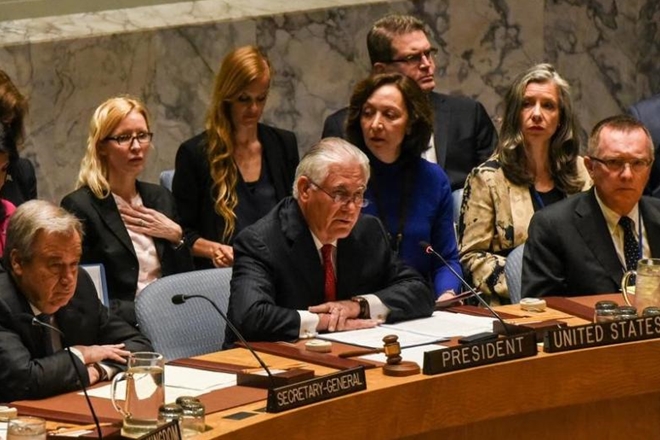U.S., China talk firmer U.N. response to North Korea's missiles
- China deports U.S. citizen convicted of espionage
- U.S. says time to act on North Korea, China says not up to Beijing alone
- China says North Korea tension has to be stopped from reaching 'irreversible' stage
- Growing US-China Trade Rift Could Be to India’s Advantage
It was not immediately clear how open Beijing might be to new sanctions. The council has traditionally boosted sanctions in response to North Korea's five nuclear tests and two long-range rocket launches.
Sanctions were first imposed on Pyongyang in 2006.
North Korea has in the past year stepped up its missile tests, firing dozens of various types of rockets, according to South Korea. The most recent test, which failed, came on Friday following a U.N. Security Council meeting on North Korea, chaired by U.S. Secretary of State Rex Tillerson.
 |
| FILE PHOTO: U.S. Secretary of State Rex Tillerson speaks at a Security Council meeting on the situation in North Korea at the United Nations, in New York City, U.S., April 28, 2017. REUTERS/Stephanie Keith |
"The cumulative actions of the DPRK (North Korea) since their last nuclear test compel us to look at a range of measures that would apply pressure," said a spokesman for the U.S. Permanent Mission to the United Nations on Tuesday.
"As Secretary Tillerson said on Friday, business as usual is not an option. We are exploring options for a response to this series of provocations with our Security Council colleagues," the spokesman said.
Tillerson on Friday urged the Security Council to act before North Korea does.
The Trump administration has been aggressively pressing Beijing to rein in its ally and neighbor North Korea, warning that all options were on the table if Pyongyang persists with its nuclear and missile development.
But China has said military threats would not help the situation and has accused the United States of fuelling tensions on the Korean Peninsula. Beijing on Tuesday reiterated its opposition to the deployment of the U.S.' THAAD anti-missile defense system in South Korea and urged it to be halted immediately.
The last round of complex sanctions imposed by the Security Council took three months to negotiate following Pyongyang's fifth nuclear test in September. Those measures aimed to cut North Korea's annual export revenue by a quarter.
Traditionally, the United States and China have negotiated new sanctions before involving remaining council members. U.N. diplomats said the current talks were still just between the pair.
At a minimum, the United States could push China to agree to condemn North Korea's missile launches in a resolution, instead of a statement, which may also blacklist more people and entities tied to the country's ballistic missile program.
This is what the council did in 2013 in response to North Korea's first launch of a long-range rocket, using ballistic missile technology, in 2012. Pyongyang said the rocket put a weather satellite into orbit.

